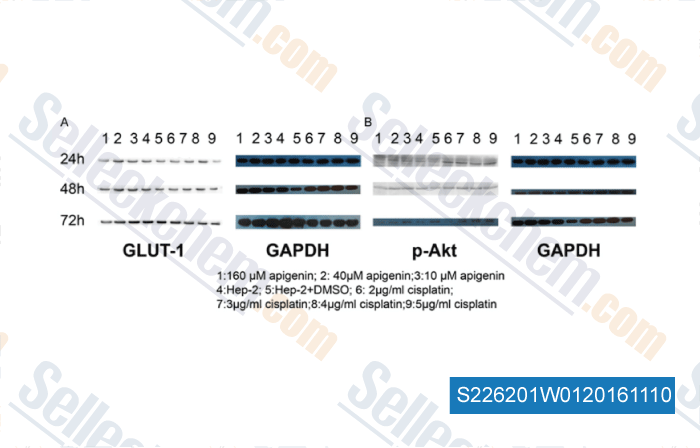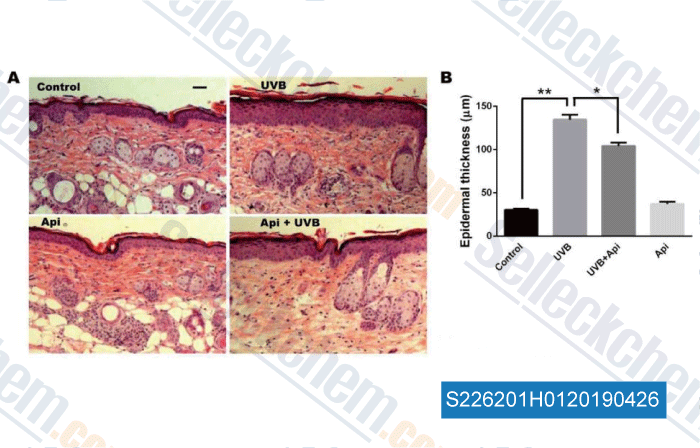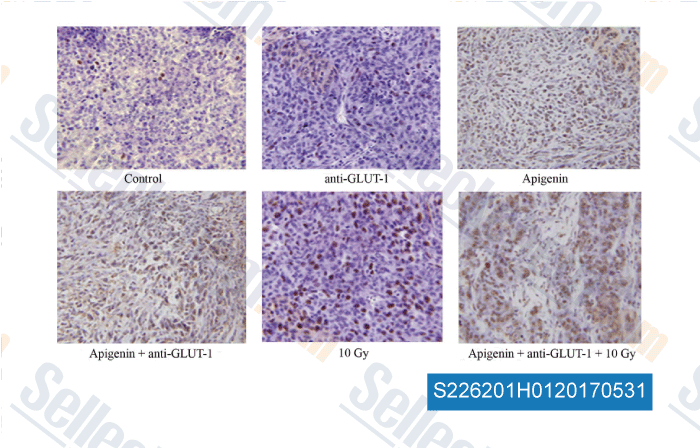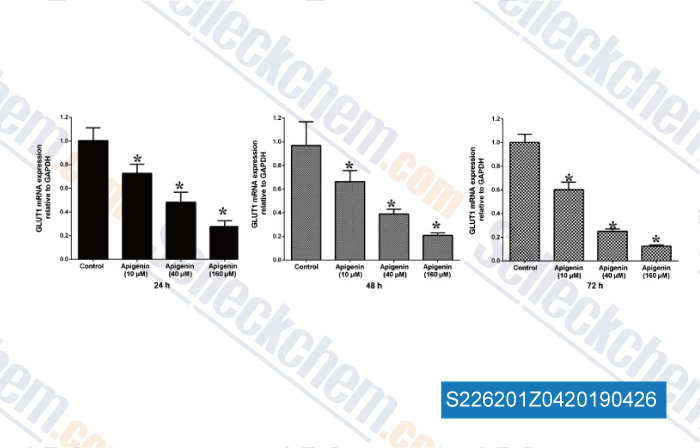|
Toll Free: (877) 796-6397 -- USA and Canada only -- |
Fax: +1-832-582-8590 Orders: +1-832-582-8158 |
Tech Support: +1-832-582-8158 Ext:3 Please provide your Order Number in the email. |
Technical Data
| Formula | C15H10O5 |
|||
| Molecular Weight | 270.24 | CAS No. | 520-36-5 | |
| Solubility (25°C)* | In vitro | DMSO | 54 mg/mL (199.82 mM) | |
| Water | Insoluble | |||
| Ethanol | Insoluble | |||
|
* <1 mg/ml means slightly soluble or insoluble. * Please note that Selleck tests the solubility of all compounds in-house, and the actual solubility may differ slightly from published values. This is normal and is due to slight batch-to-batch variations. * Room temperature shipping (Stability testing shows this product can be shipped without any cooling measures.) |
||||
Preparing Stock Solutions
Biological Activity
| Description | Apigenin is a potent P450 inhibitor for CYP2C9 with Ki of 2 μM. | ||
|---|---|---|---|
| Targets |
|
||
| In vitro | Apigenin inhibits PKC by competing with adenosine triphosphate (ATP). Apigenin also reduces the level of TPA-stimulated phosphorylation of cellular proteins and inhibits TPA-induced c-jun and c-fos expression. Apigenin exhibits the reverting effect on the transformed morphology of v-H-ras transformed NIH3T3 cells. [1] Apigenin has been shown to possess anti-mutagenic properties in a setting of nitropyrene-induced genotoxicity in Chinese hamster ovary cells. Apigenin suppresses of LPS-induced cyclooxygenase-2 and nitric oxide synthase-2 activity and expression in mouse macrophages. Apigenin has been reported to inhibit protein kinase C activity, mitogen-activated protein kinase (MAPK), transformation of C3HI mouse embryonic fibroblasts and downstream oncogenes in v-Ha-ras-transformed NIH3T3 cells. Apigenin blocks peroxisome proliferation-regulated kinase (ERK), a MAPK in isolated hepatocytes. Apigenin has further been shown to down-regulate the expression of the Na+/Ca2+-exchanger, a protein important for calcium extrusion in neonatal rat cardiac myocytes. Apigenin induces a reversible G2/M and G0/G1 arrest by inhibiting p34 (cdc2) kinase activity, accompanied by increased p53 protein stability in epidermal cells and fibroblasts. Apigenin is also effective in inhibiting TNFα-induced intracellular adhesion molecule-1 upregulation in cultured human endothelial cells. Apigenin inhibits the expression of HIF-1α and VEGF via the PI3K/Akt/p70S6K1 and HDM2/p53 pathways in human ovarian cancer cells. [2] Apigenin inhibits differentiation by suppressing MAPK signal transduction and reducing API transcription factor level in human keratinocytes. Apigenin also inhibits proliferating of human keratinocytes. [3] | ||
| In vivo | Apigenin down-regulates production of IL-4 in ovalbumin-immunized BALB/C mice. Apigenin inhibits melanoma lung metastases by impairing interaction of tumor cells with endothelium. Apigenin is shown to cause a significant increase in uterine weight and overall uterine concentration of estrogen receptor (ER)-α in female mice (64) and also suppresses prostate and breast cancer cell growth through estrogen receptor β1. Apigenin suppresses the levels of IGF-I in prostate tumor xenografts and increases levels of IGFBP-3, a binding protein that sequesters IGF-I in vascular circulation. [2] Apigenin (12.5 mg/kg) increases cell proliferation in the dentate gyrus of hippocampus of adult mice. [4] | ||
| Features | Much more potent than kaempferol and myricetin in CT-L inhibition. |
Protocol (from reference)
| Cell Assay: |
|
|---|---|
| Animal Study: |
|
References
Customer Product Validation

-
, , Int J Clin Exp Pathol, 2014, 7(7):3938-3.

-
Data from [Data independently produced by , , Cell Signal, 2016, 28(5):460-468]

-
Data from [Data independently produced by , , Oncol Rep, 2015, 34(4):1805-14]

-
Data from [Data independently produced by , , Mol Med Rep, 2015, 12(5):6461-6]
Selleck's Apigenin has been cited by 34 publications
| Apigenin inhibits lipid metabolism of hepatocellular carcinoma cells by targeting the histone demethylase KDM1A [ Phytomedicine, 2024, 135:156024] | PubMed: 39341125 |
| The Effects of Resveratrol and Apigenin on Jejunal Oxidative Injury in Ducks and on Immortalized Duck Intestinal Epithelial Cells Exposed to H2O2 [ Antioxidants (Basel), 2024, 13(5)611] | PubMed: 38790716 |
| Viscoelastic high-molecular-weight hyaluronic acid hydrogels support rapid glioblastoma cell invasion with leader-follower dynamics [ bioRxiv, 2024, 2024.04.04.588167] | PubMed: 38617333 |
| Viscoelastic high-molecular-weight hyaluronic acid hydrogels support rapid glioblastoma cell invasion with leader-follower dynamics [ bioRxiv, 2024, 2024.04.04.588167] | PubMed: 38617333 |
| Connexin43 is associated with the progression of clear cell renal carcinoma and is regulated by tangeretin to sygergize with tyrosine kinase inhibitors [ Transl Oncol, 2023, 35:101712] | PubMed: 37354638 |
| Synergism Antiproliferative Effects of Apigenin and Naringenin in NSCLC Cells [ Molecules, 2023, 28(13)4947] | PubMed: 37446609 |
| Synergism Antiproliferative Effects of Apigenin and Naringenin in NSCLC Cells [ Molecules, 2023, 28(13)4947] | PubMed: 37446609 |
| Nao Tan Qing ameliorates Alzheimer's disease-like pathology by regulating glycolipid metabolism and neuroinflammation: A network pharmacology analysis and biological validation [ Pharmacol Res, 2022, 185:106489] | PubMed: 36228869 |
| Glycosylated modification of MUC1 maybe a new target to promote drug sensitivity and efficacy for breast cancer chemotherapy [ Cell Death Dis, 2022, 13(8):708] | PubMed: 35970845 |
| Apigenin Induced Apoptosis by Downregulating Sulfiredoxin Expression in Cutaneous Squamous Cell Carcinoma [ Oxid Med Cell Longev, 2022, 2022:8172866] | PubMed: 35965686 |
RETURN POLICY
Selleck Chemical’s Unconditional Return Policy ensures a smooth online shopping experience for our customers. If you are in any way unsatisfied with your purchase, you may return any item(s) within 7 days of receiving it. In the event of product quality issues, either protocol related or product related problems, you may return any item(s) within 365 days from the original purchase date. Please follow the instructions below when returning products.
SHIPPING AND STORAGE
Selleck products are transported at room temperature. If you receive the product at room temperature, please rest assured, the Selleck Quality Inspection Department has conducted experiments to verify that the normal temperature placement of one month will not affect the biological activity of powder products. After collecting, please store the product according to the requirements described in the datasheet. Most Selleck products are stable under the recommended conditions.
NOT FOR HUMAN, VETERINARY DIAGNOSTIC OR THERAPEUTIC USE.
